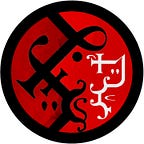Cocytus — House of Levistia
The princes and princesses of Cocytus are from House Levistia, the noble house descending from the archdevil Levistus, saint patron of who searches, warden of mysteries, and master of time.
The Levistia family has a more direct connection with their ancestor than any other princely lineage. There have never been far branches or distant cousins taking the crown, with the heir always being the son or daughter of the previous prince (or, a couple of times, a nephew).
This smooth lineage is less a sign of peacefulness and diplomatic skills and more a proof of the rooted disinterest of this house in the internal struggles of the Empire.
They are content just attending their business, springing into action only if someone threatens their interests directly. In the Empire Council, they call for calm, to wait out, and to attend to something else first, especially when matters concerning the Angelic Unison are involved: the celestial nation is so far away that they don’t live it like a contingent problem but as a philosophical question. This attitude raises cyclic concerns by the nearby principality of Dis and Erebus about Angelic infiltrators in the aristocracy, if not the court itself. These spies must be either tremendously excellent or terribly ineffective since no proof of celestial meddling has ever arisen.
The Levistina family is impervious to one of the most common political tools: marriage. The cocytian nobility has an eccentric tolerance, if not outright predilection, for love marriages over more sensible and practical options. The widespread appreciation for divination magic seems to play a role, with improbable matches blessed by favorable oracle responses and obvious choices shunted in favor of foretold “true love” just around the corner. There is also an inexplicable attraction to star-crossed romances, and young nobles seek out doomed relationships and their melancholic thrills.
The Dowager Princess, Bellafagora, married her late husband, Prince Forneus IV, out of love. She was just the third daughter of an unimportant count of Maladomini, living in the rural western part of that nation. When Forneus stopped in her villa during his Grand Tour, he was lovestruck and had to take her with him for the rest of his trip. They wed on a whim in a chapel in the middle of nowhere in Nessus, just before reaching the empire capital Goetia.
Even for the romantically oriented Cocytian nobility, that “country girl” seemed an improper spouse for the prince, but Bellafagora quickly proved herself and gained their respect. Her down-to-heart and pragmatic attitude cut through the self-indulging ruminations of the court and the nobles. Less sighing looking out of windows, less reveling in what it could be, less anxious pondering of conflicting prophecies: the princess focused on income and expenditure, warehouse space, cargo efficiency. The nobles tore their clothes up in despair and clutched all the pearls they could grab, but eventually, the extra income Bellafagora provided healed all hurt feelings.
Forneus died, as foretold, trampled by a horse. It was not an animal: during the visit to the shipyards, the figurehead of the ship “Black Stallion” fatally fell on him. Forneus was a beloved ruler. He managed to never succumb to the fatalist and anguished temperament typical of his bloodline, keeping a proactive stance and firm and wise governance.
The widowed Bellafogora acted regent for five years until the heir, Vepar, came of age. In a very Maladominian fashion, she kept all factions on the same page arranging feasts where nobles, clerics, and guild masters could all bond and connect. The only recrimination aristocrats (and commoners alike) have is that the princess made penguin hunting illegal.
For a “land girl” like Bellafagora, the clumsy birds crowding Zagan and the northern cities are exotic, cute, and all-around adorable. Locals, on the other hand, see penguins as pests, worse than pigeons or seagulls, always trying to steal food, making noises, always being in the way, and always smelling.
Waddles of penguins, tall as children, congest the alley and demand food more and more aggressively as their population grows.
Unfortunately for the poor inhabitants of the harbor towns, the current Prince, Vepar II, has inherited the same fondness for penguins as his mother, and an end to the hunting ban is not imminent.
In general, the prince has taken more from his father: he has the same restless and gloomy demeanor, and everybody hopes marriage will shape him up, as it happened to his parents. Veper didn’t find a fianceé during his Grand Tour, so many noble families are sending their daughters to him, strategically stirring the girls’ Grand Tours there.
Almost every week, a new eligible bachelorette arrives at the prince’s door, but no one seems to be “right”. While the castle becomes ever more stuffed by suitresses, all nervous to spend their time with rivals, the prince prefers to keep a distance.
Veper has made built a lodge in a secluded bay, a “good retreat” where to be alone (with all his attendees in a nearby but out-of-sight dependence). There, he spends his days reading poetry, looking at the horizon, doing long walks on the beach, and feeding penguins.
